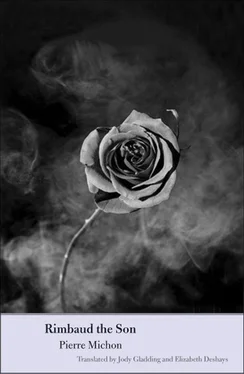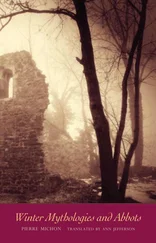The Gilleses have seen the considerable passerby; they believe they have seen him pass; invented his passing; there where he passed they see a great furrow that cuts the field of poetry in two, rejecting the old-fashioned on one side, full of beautiful works of course, but old-fashioned, and on the other, the proud ravaged acre of the modern where perhaps nothing grows, but modern; he passed; and when he passed there they were leaning over their poets’ desks and silently they speak to us of him, the horrible plowman, the white blackbird. They watch the comet; they note its winding paths; it has twelve feet and sometimes no feet at all or a thousand feet, that much they have found; they are looking for the place, the formula, and the key; they believe that it is coded; they combine those numbers; they are nearly there; they are going to see: and suddenly, if a sharper laugh rises behind their backs, if silk murmurs beneath the Italian pines, if a woman’s voice as if from very far off calls to them in the great silence, they look up from their notebooks and wonder if the comet really did pass, if their mathematics mean anything, if poetry exists in person , or if it is the Harlequin who has rolled them in flour. Alas, Rimbaud has a talent for throwing flour in the eyes of those who approach him: and as I say this, my arms hanging, I begin to cough; if I beat my breeches, flour comes out of them. But sometimes I imagine, and all the Gilleses surely imagine with me, in the brief moments when we forgive ourselves, when we can bear ourselves, when for example the evening wind passes in those Italian pines that Watteau has painted behind us, when our colds are abating, when looking down at ourselves we no longer see flour but a kind of smock of light, then yes, in those moments we imagine that before us stands a tall boy who also had big heavy hands, working hands, like those of a laundress , says Mallarmé, a boy who to dust off his own flour beat his flanks to death with rhymes, the renunciation of rhymes, refusals, slave labor; who, to appear free, not of this world, not from Charleville, not born of the poor woman née Cuif, shut us into the modern slave galley — I imagine that this very weary boy is before us, standing there in his great clumsy shoes, he looks at us and lets his big hands hang. He is before us, the same size or almost, on his two feet; he comes from afar; there he no longer knows that he has created what we call a work; he has no more anger; greatly astonished he regards in our hanging hands the endless, futile Rimbaudian gloss. A thousand times he reads his name, then the word genius , then the old word archangel , then the words: absolutely modern , then illegible numbers, then again his name. He lifts his eyes to ours; and we remain there face to face, unmoving, dumbstruck, old-fashioned, the Italian pines behind us suspended in a breath of air, he is about to speak, we are about to speak, we are going to pose our question, we are going to reply, we are there — the pines rustle in a sudden wind, Rimbaud once again has leapt into his dance, there we are all alone, pen in hand.
We are annotating the Vulgate.
5. AGAIN WE TAKE UP THE VULGATE
Again we take up the Vulgate.
It is said that in the fight in which he struggled every inch of the way with Carabosse, since the inner closet may not have been completely sealed, Arthur Rimbaud sometimes ran off to lose her in the Ardennes countryside; that his long strides carried him into villages as formidable and dreary as cannon fire, handkerchiefs stuffed into the mouth, Warcq, Voncq, Warnécourt, Pussemange, Le Theux; that he was hungry for those places, for those handkerchiefs, for those cannons, and that the verses he strewed along the way said so; that he was hungry with ambition and tricked his hunger with little rhythmical pebbles, ogre and Tom Thumb, as his legend would have it. It is said that a longer escape, a dream, at the end of summer took him to Belgium, toward Charleroi by small paths with blackberries no doubt, mills among the trees, factories rising at the end of an oat field, and we will never know exactly where he passed or where his young mind seized upon some quatrain now better known in this world than Charleroi, where he was left holding the laces of his big shoes under the Big Dipper, but we know that, returning, he stopped in Douai, at the home of Izambard’s aunts, three gentle Fates at the far end of a large garden, fussy old seamstresses, and that those days in the large garden at the end of summer were the loveliest days of his life, perhaps the only lovely ones. It is also said that in that garden he made the poem every child knows, in which he calls his stars like one whistles for one’s dogs, in which he caresses the Big Dipper and lies down beside it; and that summer’s end was all rhythm, usually twelve feet, and Rimbaud, suspended on the rod in the northern sky but at the same time with his two feet under the table in the green inn, got all that onto the rod at one time, the pretty girl serving the ham, the arbor where he eats it, and the North Star rising overhead. And it is pure happiness. It is the very simple appearance of truth, which resembles God or a little dead girl, behind a bank of flowers in September. It is said that two escapes especially, without stars this time, far from gardens, far from truth, took him to Paris. And no one was waiting for him.
There is dispute over whether he took part in the insurrection of the Commune; if he had the pleasure and the terror of holding at rifle point a sworn enemy, evil in person, that is also to say, a poor devil from the depths of the country to whom Monsieur Thiers in Versailles had entrusted plume and rifle, and if, with the deafening beat of the two antithetical cymbals in his heart, he shot; or if he was the little drummer boy perched on the barricade; and if below the barricade he ate soup with the poor, the obscene, the gentle idiots, if he smoked tobacco with them; we would like to believe so, but it does not really seem as though we can, that story is in Les Misérables , by the Old Man, not in the life of Arthur Rimbaud. Member of the Commune or not, he returned to Charleville with the red spittle of battle like grapeshot in his heart. It is said that from Charleville in May, on May 15, he wrote to Paul Demeny, poet from Douai, author of Les Glaneuses , whom the silver nitrates had also fixed once and for all and transmit to us for reasons that have nothing to do with Les Glaneuses , and in the photo on page 54, beyond Izambard, beyond Banville, we see the poet’s goatee, the little pince-nez, the blown-back hair, the proud profile gazing squarely away toward the blue line of posthumous glories: we know that he sent to that famous addressee — whose fame was cheaply won for having once received ten or twenty pages — the so-called Seer letter; this is an avatar of the old justification of the poet, idealist, voluntarist, missionary, magician — the bravado, the pro domo smokescreen; it wears the new clothes of democratic Orphism because it is meant to please, to please the poets of Douai and elsewhere; and it is much more than that, because it is written by a young man who is trying hard to believe in it with his whole heart. But, bravado or stroke of genius, we read and reread that letter, bent over our poet’s desk, we answer it as Demeny did the first time: because “to find a language” and “make oneself a seer ” are written in black and white in that letter — and those things that had been in the air for twenty years or two centuries, those things that had already been said, with more or less fanfare, by the red waistcoat, the Old Man, and by the other red waistcoat, the one who truly wore the red waistcoat in the swell of Hernani , Gautier, had been said too by Baudelaire, whose waistcoat was long and dark, by Nerval, by Mallarmé, those things are said here in a more convincing fashion, more youthful, more warlike: and so it is right that at our poet’s desk we tacitly agree that they were said here for the first time. It seems new to us, eternally new; but I want to believe with my whole heart that, for Rimbaud, it became old-fashioned poetics the very moment he put his letter into the box, maybe at the moment he signed it — although he tried to believe in it with his whole heart. It is said that he sent the young Verlaine a letter of the same kind, voluntary, provocative, superb; it is lost. It is said that Verlaine sank his teeth into that bait; and that at the end of another summer, in September 1871, for a third time a train hurled Rimbaud into Paris: but that third time, Cros and Verlaine must have waited for the dear great soul at the gare de l’Est, and Rimbaud, in the pocket of his too-short pants that showed his blue cotton socks, which we know exactly, socks knitted for him by Carabosse with a feeling we do not know exactly, perhaps love, in that pocket he had the impeccable homework, Le Bateau ivre , honed perfectly from one end to the other to please the Parnassus, and in the Parnassus to take first place.
Читать дальше












